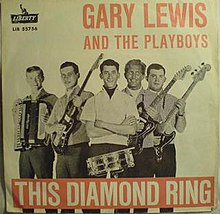Gary Lewis & the Playboys version
| "This Diamond Ring" | ||||
|---|---|---|---|---|
 | ||||
| Single by Gary Lewis & the Playboys | ||||
| from the album This Diamond Ring | ||||
| B-side |
| |||
| Released | January 1965 | |||
| Recorded | November 19, 1964 | |||
| Studio | United Western Recorders, Hollywood, California | |||
| Genre | Pop rock | |||
| Length | 2:15 | |||
| Label | Liberty | |||
| Songwriter(s) | Al Kooper, Bob Brass, Irwin Levine | |||
| Producer(s) | Snuff Garrett | |||
| Gary Lewis & the Playboys singles chronology | ||||
| ||||
According to David Brackett, Lewis' vocals were heavily supported by Ron Hicklin's overdubs. [2] The session drummer was Hal Blaine, [3] Joe Osborn played bass [4] and Leon Russell played keyboards and arranged the music. The song was produced by Snuff Garrett.[ citation needed ] Lewis has denied claims that the Playboys did not play on the record, and says that not only was the band largely self-contained, but the Wrecking Crew session musicians only came to do overdubs or solos. [5]
Although it has been his biggest commercial success as a songwriter, Al Kooper has reportedly stated many times that he was unhappy with the record. [6] He originally hoped the song would be recorded by a group like The Drifters and based on the original demo of the song as recorded by Jimmy Radcliffe. Kooper would later re-visit the song, recording a funky version for his 1976 album Act Like Nothing's Wrong.